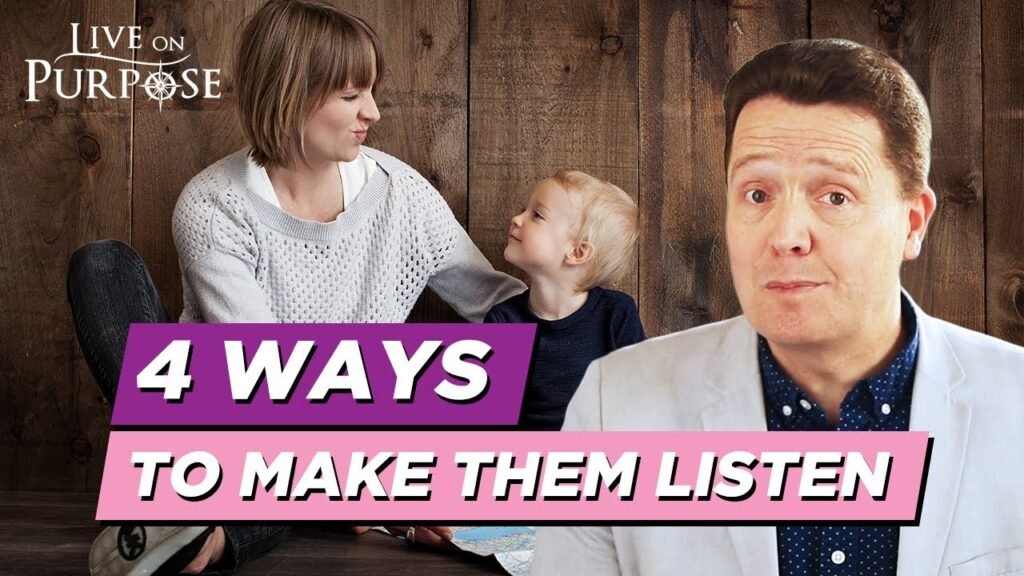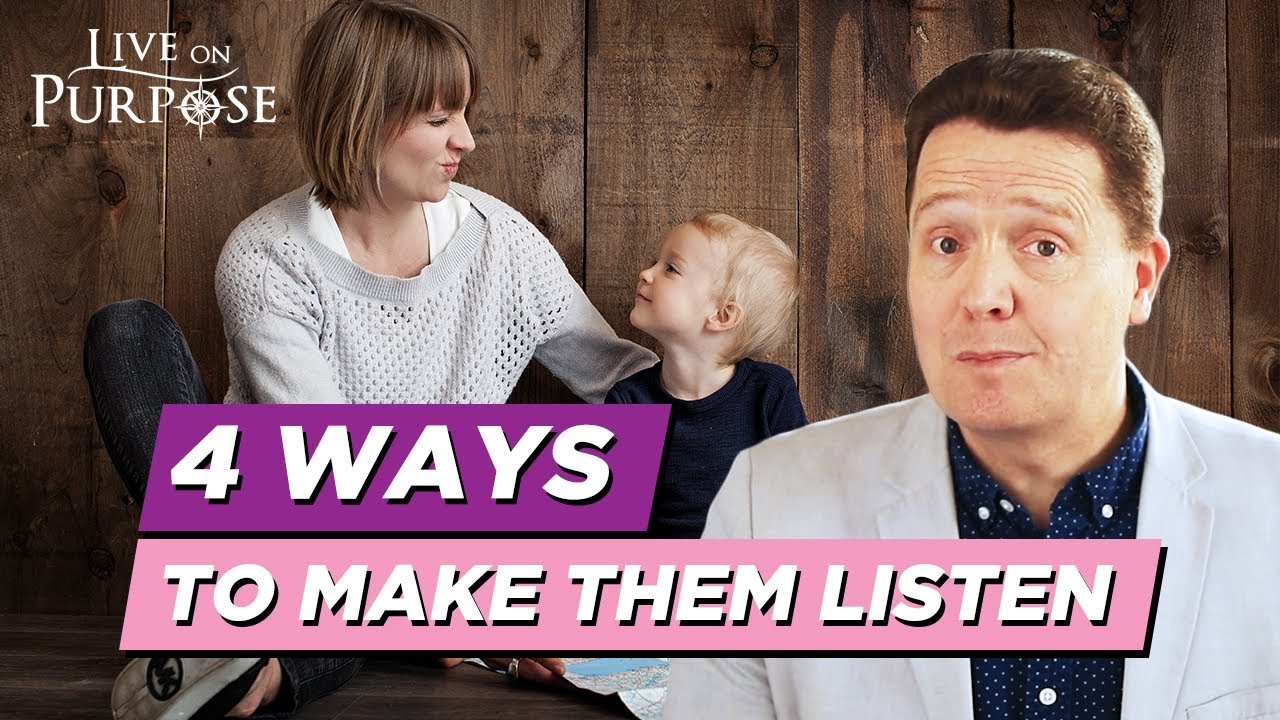In the video “How To Talk So Kids Will Listen” by Live On Purpose TV, Dr. Paul Jenkins shares four strategies to help you communicate with little kids better. The first strategy is language, where you simplify your words and explain things in a clear way suitable for their age and stage of development. The next strategy is level, where you get down to their level physically and make eye contact to show that you are approachable and with them. Then, there’s leaning in, both physically and psychologically, to get into their space and acknowledge them as a person. Lastly, there’s lighting up, bringing some enthusiasm and expressiveness to your face to keep their attention. By implementing these strategies, you establish a connection with children and increase the likelihood of them actually listening to you.
Talking to little kids can sometimes be a challenge, but it’s important to remember that they are little people too. In this video, Dr. Paul Jenkins provides four valuable tips to improve communication with kids: language, level, lean in, and light up. By choosing suitable language for their age and development, getting down to their level, physically and mentally leaning in, and bringing enthusiasm to your face, you establish a connection that helps kids feel heard and understood. Practicing these strategies may require effort, but it can lead to a stronger parent-child relationship and more effective communication.
Language
When communicating with little kids, it is important to use language that is suitable for their age and development. Little kids may not have the same language skills as adults, so it is necessary to simplify words and explain things clearly. By doing so, you can ensure that they understand what you are saying and can actively participate in the conversation. Take into consideration their level of linguistic ability and choose words that they can easily comprehend. Adjusting your language to meet their needs will facilitate effective communication and strengthen the parent-child relationship.
Level
In order to effectively communicate with little kids, it is important to get down to their level. Physically lowering yourself to their eye level can help create a sense of connection and make them feel more comfortable. When kids feel that you are on their level, they are more likely to engage in conversation and express themselves openly. Making eye contact while communicating further reinforces this connection and shows that you are actively listening and paying attention to them. Being at their level promotes a positive and supportive environment for effective communication.
Lean in
When communicating with little kids, it is beneficial to lean in both physically and psychologically. Physically leaning in shows that you are fully present and engaged in the conversation. It demonstrates that you value what they have to say and are interested in their thoughts and feelings. Psychologically leaning in means maintaining a mindset of attentiveness and interest. By leaning in emotionally, you create an atmosphere of understanding and connection, which encourages kids to communicate more openly and honestly. By leaning in both physically and psychologically, you establish rapport and facilitate effective communication.

Light up
To capture the attention of little kids and make communication more engaging, it is important to bring light to your face. Showing expression and animation when speaking helps to maintain their interest and keep them engaged in the conversation. Little kids respond positively to facial expressions and are more likely to listen and understand when they see a lively and expressive face. By bringing light to your face, you create a visual connection that enhances communication and encourages active participation.
Listen
Listening is a key aspect of effective communication with little kids. Model the act of listening by giving them your full attention when they are speaking. Pay attention to their expressions and needs, and respond with empathy and understanding. By actively listening to what they are saying, you show them that their thoughts and feelings are valued. Listening creates a connection and helps to establish trust, making them more likely to communicate openly with you. Establishing a strong parent-child relationship starts with listening and being attentive to their needs.
The Relationship Matters
Building a strong parent-child relationship is crucial for effective communication with little kids. When they feel a sense of trust and connection with you, they are more likely to actively engage in conversations. By honoring and respecting them for who they are as individuals, you create a foundation of trust and understanding. Building a positive relationship with your child sets the stage for open and honest communication, making it easier to address any concerns or issues that may arise. Investing in your relationship with your child is essential for effective communication and their overall well-being.
Benefits of Effective Communication
Effective communication between parents and kids has several benefits. It leads to a better understanding of each other’s thoughts, feelings, and needs. When kids feel understood, they are more likely to share their thoughts and concerns openly, fostering a positive parent-child relationship. Effective communication also has a positive impact on a child’s overall development. It helps them develop their language and communication skills, as well as their social and emotional intelligence. By actively engaging in effective communication, parents provide their kids with the tools they need for healthy development and successful relationships.
Practice and Intention
Improving your communication skills with little kids takes effort and intention. It is important to practice the strategies mentioned earlier consistently. By making a conscious effort to use suitable language, get down to their level, lean in, and light up, you can enhance your communication with your child. Consistency is key in developing effective communication habits. As you continue to practice and refine your skills, you will notice improvement in your ability to connect and communicate with your child. Remember, effective communication is a skill that can be learned and developed over time.
Engaging in Discussions
Encouraging comments and discussions about conscious parenting can create a supportive online community. By sharing your experiences and insights, you can contribute to the learning and growth of other parents. Engaging in discussions allows for a deeper understanding of different perspectives and strategies. It provides an opportunity to learn from each other and gain new insights into effective communication with little kids. Creating a supportive online community can foster a sense of belonging and provide a platform for parents to share their challenges and successes in parenting.
Additional Resources
To expand your knowledge and skills in effective communication with little kids, there are additional resources available on parentingpowerup.com. Accessing these resources can provide further guidance and support in developing your communication skills. Take advantage of the information and tools offered to continue growing as a conscious and effective parent. The more you invest in your own growth, the better equipped you will be to communicate and connect with your child.
Effective communication with little kids is a vital aspect of parenting. By using suitable language, getting down to their level, leaning in, lighting up, and listening attentively, you can establish a strong parent-child relationship and foster effective communication. The benefits of effective communication are numerous, including better understanding between parents and kids and positive impact on a child’s development. With practice, intention, and engagement in discussions, you can continue to enhance your communication skills and create a supportive parenting community. Accessing additional resources can further support your growth as a conscious and effective parent.

